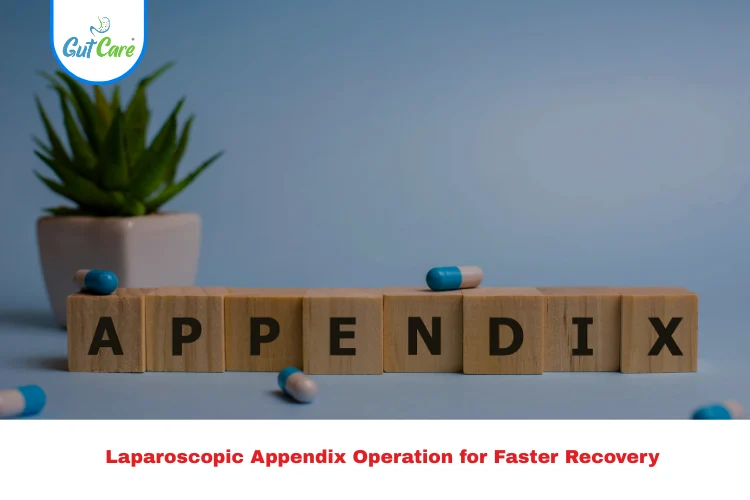Receiving news that you might require an operation for your appendix can be quite unsettling. It is not uncommon for people to envision long hospital stays, a great deal of pain, and a large visible scar. However, with advancements in surgical techniques, this is now changing.
At Gutcare Clinics in Bangalore, under the leadership of gastrointestinal surgery specialist Dr. Yuvrajsingh Gehlot, patients now have the benefit of laparoscopic surgery for appendicitis. This is a minimally invasive means of doing appendix operation, and uses small incisions, decreasing post-surgical pain, and a much faster return to routine.
What Is the Appendix and Why Is It Removed?
The appendix is a small, tube-shaped organ attached to the large intestine. While its function in the human body isn’t essential, it can become inflamed and infected — a condition called appendicitis.
Appendicitis often starts suddenly, and if left untreated, it can lead to a rupture, spreading infection inside the abdomen. The only permanent solution is an appendix operation to remove it.
Understanding Laparoscopic Appendix Operation
Laparoscopic surgery, sometimes called “keyhole surgery,” involves making a few small incisions in the abdomen. Through these openings, the surgeon inserts a laparoscope (a tiny camera) and specialized instruments. The camera sends images to a screen, allowing the surgeon to remove the appendix with precision.
Compared to the traditional open approach, laparoscopic surgery offers:
- Less post-operative pain
- Smaller scars for better cosmetic results
- Reduced hospital stay (many patients go home within 24 hours)
- Lower risk of wound infections
- Quicker recovery so you can return to work and activities sooner
When You Should Suspect Appendicitis
Appendicitis can progress quickly, so recognizing the symptoms early is important. Common signs include:
- Sudden stomach ache that was initially around the navel and later got the lower right side of the abdomen
- Nausea and vomiting
- Fever and shivering
- Not feeling like eating
- Feeling uncomfortable due to gas or swelling in the stomach
If you notice these symptoms, seek medical help immediately. Timely diagnosis and treatment can prevent serious complications.
Diagnosis Before Appendix Operation
At Gutcare Clinics, diagnosis is handled with care and speed. Dr. Yuvrajsingh Gehlot may recommend:
- A physical exam to check for tenderness in the lower abdomen
- Blood work to check for signs of infection
- Ultrasound or CT scan to confirm appendicitis and rule out other conditions
Once appendicitis is confirmed, an urgent appendix operation is usually advised.
The Laparoscopic Procedure at Gutcare Clinics
Here’s what patients can expect at Gutcare Clinics:
- Preparation – Patients will be given instructions to prepare for the surgery, details about the method of anesthesia, and a guideline about fasting.
- Anesthesia – Usually a general anesthesia is given so that the patient is completely asleep and comfortable during the whole process.
- Surgery – The surgery is performed laparoscopically with the help of a camera and scissors which are inserted through the small incisions.
- Closure – The small wounds are closed with stitches or surgical glue.
- Recovery Room – You’ll be monitored for a few hours before returning to your room.
Most patients are discharged the next day, though some may leave the same evening.
Recovery and Aftercare
Recovery after a laparoscopic appendix operation procedure to treat an inflamed appendix is usually smooth, but post-operative care must be followed strictly:
- Good rest for a couple of days
- Maintaining a soft diet with foods that are easy to digest until you return to normal digestion
- Avoiding heavy lifting for a couple of weeks (2–3)
- Keep the site dry and clean
- Attending follow-up visits with your surgeon so he or she can check on the progress of healing
Most patients find they can return to work or school within a week or two, with athletes and those doing hard physical work possibly needing longer.
Conclusion
An appendix operation doesn’t have to translate to weeks of discomfort. With laparoscopic techniques, recovery is faster, pain is lower, and the scars are minimal.
If you suspect appendicitis, you should quickly obtain help to avoid complications.
If you are looking for expert, compassionate care in Bangalore, Dr. Yuvrajsingh Gehlot and the team at Gutcare Clinics strive to make your surgical procedure as safe, and comfortable as possible.
Frequently Asked Questions
1. How much time is required to recover after laparoscopic appendix surgery?
Patients resume with their routine activities between 1 and 2 weeks; however, internal healing may take 4 to 6 weeks.
2. Is appendix operation safe?
Yes, with an expert surgeon, the operation of the appendix is said to be very safe with minimal risks.
3. How would I know if I need surgery for appendicitis?
Continued pain in the right lower abdomen, fever, nausea, and loss of appetite are danger signs. If these symptoms are present, seek medical attention immediately.
4. Why choose Gutcare Clinics in Bangalore for an appendix operation?
Gutcare Clinics provides latest technology in laparoscopic surgery, skilled doctors, and patient-oriented treatment for quick recovery.
5. Can appendicitis heal without an operation?
No, surgery offers a permanent cure. If delayed, the appendix can rupture, exposing the person to severe complications and infections.




